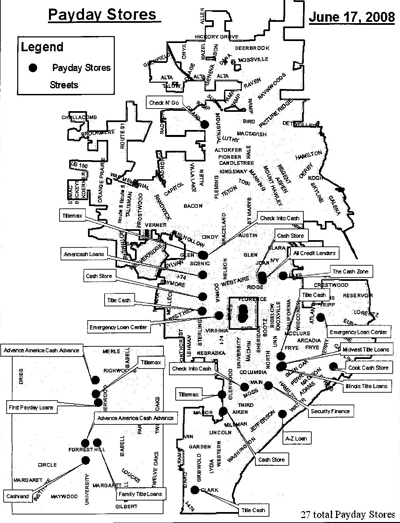The Controller-Treasurer for Peoria Public School District 150 is Guy Cahill. His contract, which took effect in February 2005, expires June 30, 2008. Renewal of Cahill’s contract was on the agenda for the last school board meeting, but at the last minute was removed from the agenda, so no vote was taken. I have no idea why that happened, but since we have some extra time to consider Cahill’s performance, let’s look at the performance goals in his 2005-2008 contract.
[Section 1] d) This Contract shall be a performance-based contract. The Controller-Treasurer, Deputy Superintendent and School Board shall mutually agree to financial improvement goals to enhance student performance and academic improvement, the goals shall be attributable to the responsibilities and duties of the Controller-Treasurer. The goals shall be attached to and become a part of this Contract as Appendix A. One goal shall be the removal of the School District from the Illinois State Board of Education Financial Watch List by June 30, 2006 It is understood that the attainment of this goal is not solely within the power of the Controller and the attainment of this goal will be judged based upon the efforts of the Controller-Treasurer to attain this goal and not necessarily upon the actual removal of the School District from the Financial Watch List within the time period.
And here are the performance goals as listed in Appendix A:
- Develop FY’06 Budget and present in a meaningful way for use by management as a decision-making tool; include, as necessary, “other sources” of funds to ameliorate expenditures exceeding revenues.
- Streamline and organize general ledger to facilitate improved reporting to the Board.
- Restructure depository and bank accounts to improve efficiencies and reconcilement.
- Provide periodic reports to the Board including statements of position, budget to actual, and cash flows.
- Develop long-range budget projections including revenue and expenditure estimates.
- Facilitate Structural Budget Imbalance Task Force work.
- Develop and implement necessary short-term financing strategy to address cash flow concerns and shore-up reserves.
- Provide leadership in developing and negotiating wage and benefit components of collective bargaining agreements.
- Develop a system and/or train staff individual to monitor compliance with state and federal grants and review the same for propriety.
I’m not going to go through each of these line by line, but I do want to point out some information that’s available through the Illinois State Board of Education’s website — that is, District 150’s audits. In the June 30, 2007, audit (large Excel file), there is a section called “Schedule of Findings and Questioned Costs,” and it includes these statements:
In an ideal control setting, the District would have personnel possessing a thorough understanding of applicable generally accepted accounting principles staying abreast of recent accounting developments. Such personnel would perform a comprehensive review procedure to ensure that in the preparation of its annual financial statements that such statements, including disclosures, are complete and accurate. […] The District has not made it a practice to send District officials or other personnel to training classes to update them on the on-going changes and complexities of generally accepted accounting principles.
That’s pretty serious. But there’s more; this finding is listed as a “repeat from prior year,” meaning it was identified before but has not been resolved:
The overall internal controls over the District’s accounting system are not adequate to ensure that misstatements caused by error or fraud, in amounts that would be material to the financial statements, may occur and not be detected wtihin a timely period by employees in the normal course of performing their assigned functions. […] Reconciliation of many of the general ledger accounts to the underlying supporting documentation was not performed during the year (accounts receivable, payroll withholding liabilities, miscellaneous asset and liability accounts). […] Significant errors and/or omissions were not discovered by District employees and corrections were not made to the general ledger until the annual audit was performed at the end of the fiscal year. This resulted in inaccurate financial information being recorded in the general ledger for most of the year.
And, this was concerning as well, also a repeat from the prior year:
The District did not submit accurate [project] expenditure reports. Some expenditures claimed were either non-allowable, misclassified, reported inaccurately, or required additional documentation to trace to the underlying general ledger accounts. Total expenditures as reported on the project completion report were greater than total expenditures on the general ledger.
In the 2006 audit, there was a grant compliance problem. “The district claimed more administrative costs than were allowable on the Reading First grant.” Specifically, “The District claimed $20,577 of general administration expenditures,” but “allowable general administrative expenditures should have been $16,556” — a difference of $4,021.
This year, things have gotten worse regarding federal grant compliance. You may recall that District 150 spent $681,000 in Title I funds that the state said were not allowable. And District 150 is still very much on the financial watch list.
I think it’s worth asking how much of this is the responsibility of the Controller-Treasurer, and how much he should be held accountable for these (what I consider to be serious) problems which seem to be ongoing and increasing in severity. I trust the school board is doing just that, and perhaps that’s why the contract renewal was removed from the agenda.

